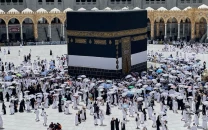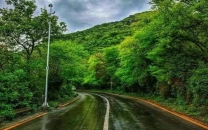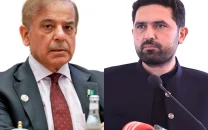Year ender: Of hope, false and real
2013 seems to be the year where I had to exert myself ever harder to convince myself that things really were normal.

2013 seems to be the year where I had to exert myself ever harder to convince myself that things really were normal. PHOTO: FILE
But, as things go, it all wore thin pretty quickly because it was pretty hard to shrug off the fact that one’s illusion of stability and normality clearly does not suit a vast number of people in this country who consider themselves—or wish to consider themselves—citizens of this country. Here I list three things that were reminders of our collective failures in 2013, and two things that beaconed real hope that we can take with us into the year 2014.
1. More Progress
After the electoral results were announced in May this year, a set of images entitled ‘KPK 2018’ went viral on social media. The images showed a Dubai-style creek with blazing skyscrapers, lined yachts, and lots of amazing roads and fast cars. These images presented in a nutshell what ‘progress’ and ‘change’ meant for a large number of our young and enthusiastic voters: PTI was supposed to put KP—and by extension, Pakistan—on the ideal of progress represented by the image; all of it funded, of course, by the money saved by eradicating corruption.
If you pause and wonder about the policies of the previous governments and this present one (privatization, road construction, opening up real estate and stock market to foreign speculators, vowing to eradicate corruption, so on), you get a fairly decent idea nobody here disagrees on the mode and meaning of ‘change’ and ‘progress’. And progress on steroids is pretty much all what we’ve been getting since Musharraf and Shaukat Aziz. And we want more.
But Peshawar is not turning into Dubai anytime soon. And thank God for that.
2. Mohammed Hanif’s The Baloch Who Is Not Missing And Others Who Are
This little pamphlet published by the Human Rights Commission of Pakistan contains six stories of Baloch men who have been missing for the last three, five, ten years and whose families have been waiting for them to turn up. Waiting and finding ways to work their despair into protest. It can be heroic if looked at from afar but to them, they are just trying to fill their time by hoping and praying their missing sons, brothers, relatives are alive; or if they are dead, their bodies will turn up in a recognizable form so that they could bury and mourn them. (It is routine for the “missing” persons to turn up as bullet-riddled bodies after a few years.)
So, yes, they have been waiting.
They can be found camping outside various press clubs of the country, turning up at morgues to identify the bodies that have been tortured and dumped in markets and quieter roads and sidewalks, meeting with various influential people all of whom tell them the same thing: Your protests are embarrassing us, please stop. In return, they are offered promises or threats. Sometimes they receive messages from their missing relatives via people who have been lucky enough to be released from the dungeons: like one Zakir Majeed, a student of English literature, a student activist who worked to raise awareness of students about Baloch rights, went missing on 8 June, 2009. For the first two years, he sent along a shirt button each time to tell his family he was alive. His elder sister, an MPhil student in biochemistry at Balochistan University, has been protesting her brother’s absence. She asks, “Look at me. I am twenty-seven years old. Zakir is now twenty-five. I want my life. I have needs. What kind of life is this?”
Among people who are missing, one thing is common: none of them believed they were doing anything that violated the law. The families of these victims have mostly been asking for one thing: charge them in the court of law and put them on trial. And if they are found guilty, punish them.
Reading these profiles, one had lots of questions, but most importantly: is a court trial that unreasonable a thing to ask if you are charged with a crime? Also, why does our state find protests more embarrassing than violence on its citizens? And yes, what kind of life is the one that Farzana Majeed is living?
Last month, the family members of the ‘missing Baloch’ started a long march. They walked 450 miles from Quetta to Karachi to raise awareness about their relatives and their fates to ordinary Pakistanis and continue their protests. They plan to walk up to Islamabad while they wait.
3. Dhinak Dhinak by Beygairat Brigade
If you try to access the URL for this funny, brilliant, and perhaps the hardest-hitting satirical song in the history of the country, you will be told that it is not safe for viewership in Pakistan. Given that we live in a country where security of ordinary citizens has been outsourced to private companies and where some people can openly threaten and kill people with certain beliefs, I did wonder why does our state feel most unsafe about artists and students and journalists who have no criminal record against them, and who, I am quite certain, cannot even lift a gun in anger? What is it about people like Zakir Majeed’s campus activism or rights activists or journalists or an innocuous song that moves our state’s security machinery to act so effectively far above and beyond its jurisdiction but fails in the case of organized criminal elements with avowed ambitions of cleansing Pakistan of people with certain religious beliefs? And why is the rest of the country is acting as if things are all right?
4. Habib University
One problem with public discourse in Pakistan is that everybody is too eager for answers to wrong kind of questions. Nobody is really worried about understanding the outrageously complicated reality we inhabit, but everybody wants solutions for it. So, one of the brightest moments of the year for me was the initiation of a new undergraduate liberal arts program at Habib University in Karachi. The idea of an indigenously developed liberal arts curriculum to the students to effectively engage with the local context and develop a critical and historical consciousness along with sound grounding in regional languages is critically urgent. Habib University seems like one of the bravest experiments in education undertaken in our part of the world—albeit a sort that should have been done a long time ago.
5. Women in public roles
Despair is always in easy reach especially when one looks at the state of women’s freedoms in Pakistan. However, if one takes a step back and compares women participation in the public sphere over the last twenty years, the difference is remarkable. While the policymakers and the public thinkers have been crying hoarse about religious extremism, et cetera, there is no doubt that the rapidly changing role of women is the most significant social change that has been taking place in urban Pakistan. And that is only going to accelerate in the coming years. That is good news for our democracy, our lives, and this society.
The German thinker Walter Benjamin once warned us: “One reason why Fascism has a chance is that in the name of progress its opponents treat it as a historical norm.” It might just be the only reason of the triumph of the fascist tendencies in our state and society. Given its contradictions, there is no question of the fact that there is no future for our current social order. The question is whether we are prepared to take on the challenge of honestly reflecting upon it and criticize its failings without thinking of ourselves as de facto policy advisers to the state or not. I hope 2014 will be the year for some urgent and much overdue reflections and conversations.
Bilal Tanweer is a writer and translator. His novel, The Scatter Here Is Too Great, has been published by Random House
Published in The Express Tribune, December 31st, 2013.



















COMMENTS
Comments are moderated and generally will be posted if they are on-topic and not abusive.
For more information, please see our Comments FAQ